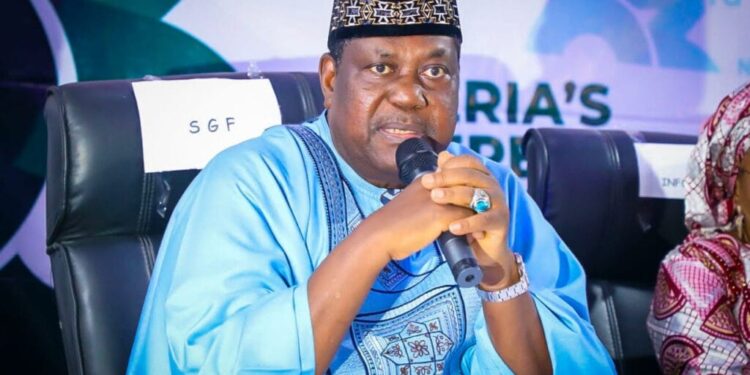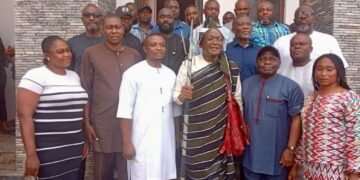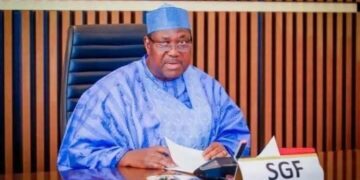The Federal Government is making progress today in implementing the Supreme Court ruling on local government autonomy. An Inter-Ministerial Committee formed to enforce the ruling will begin a two-day meeting in Abuja, the Federal Capital Territory (FCT).
During the meeting, panel members will discuss the framework for enforcing the Supreme Court’s decision, which requires the direct disbursement of funds to the 774 local government areas from the Federation Account Allocation Committee (FAAC).
The committee is chaired by the Secretary to the Government of the Federation (SGF), Senator George Akume, and includes key members such as the Minister of Finance and Coordinating Minister of the Economy, Wale Edun; the Attorney-General of the Federation (AGF) and Minister of Justice, Lateef Fagbemi (SAN); the Minister of Budget and Economic Planning, Atiku Bagudu; and the Accountant-General of the Federation (AG-F).
Other members of the committee are Central Bank of Nigeria (CBN) Governor Yemi Cardoso, the Permanent Secretary of the Federal Ministry of Finance, the Chairman of the Revenue Mobilization Allocation and Fiscal Commission (RMAFC), representatives from the Nigeria Governors’ Forum (NGF), and representatives from local governments.
Sources have indicated that the AG-F has finalized plans for the disbursement of funds to democratically elected councils this week, according to a report by The Nation.
A member of the committee, speaking anonymously, revealed that the panel’s primary focus is to finalize measures to ensure the financial and administrative independence of the 774 local councils, despite pushback from some governors. The committee is expected to take steps to counteract attempts by certain governors to retain direct access to funds from FAAC and undermine the autonomy of local governments.
The source also disclosed that the panel would proceed with the assignment after receiving “guidelines and guidance” from the Attorney-General of the Federation (AGF) and Minister of Justice.
He acknowledged the need for specific clarifications on how best to handle resistance by some state governments ahead of the commencement of direct payments to local governments this week.
“We are waiting for the pronouncement of the Attorney-General first. We will take a position before Wednesday,” the source said.
The two-day meeting is expected to evaluate the Committee’s progress and finalise operational frameworks for direct payments.
According to the source, the meetings aim to address the moves by some governors to coerce elected local government leaders into truncating the objectives of the autonony.
“The meetings will address the actions of governors attempting to undermine the autonomy of democratically elected LGA chairmen, deputies, and councilors, ensuring they are not coerced into serving state interests,” he added.
Despite the Supreme Court’s ruling, some governors are maneuvering to maintain their hold on council funds by influencing Houses of Assembly to pass laws empowering state governments to have access and retain oversight on the FAAC allocations.
Shedding light on the challenges before the committee, he said: “There are a lot of discussions going on, but for now, honestly, we are waiting to see. While all the states have conducted local government elections, some governors are determined to maintain financial control over local government areas.”
In preparation for the Supreme Court judgment’s implementation, the Office of the Accountant-General of the Federation (OAGF) confirmed its readiness to commence direct FAAC disbursements to councils.
A senior OAGF official disclosed that structures are already in place to ensure a seamless transition.
The official said: “It won’t be a challenge to carry out the approval from the minister to start making the disbursements to the LGAs. The structure has been on the ground.”
He pointed out that a dedicated department within the OAGF would oversees the processes, assuring that the transition will proceed smoothly.
“A whole department is in charge of it. So, it’s not going to be a challenge. I can confirm that,” he stressed.
The source hinted that Finance minister might consult with President Bola Ahmed Tinubu upon his return to the country this week to finalise strategies for dealing with governors.
“The minister of Finance might have discussions with President Bola Tinubu and others on how to address the issue of governors. But we are paying local government areas directly.
“We don’t want to presume anything. Everyone knows the judgment has been made, and we are waiting for the government to start implementing.”
The implementation of direct FAAC allocations to local governments represents a major shift in local government administration, designed to reduce undue interference by governors. In the past, funds intended for grassroots development were channeled through joint accounts managed by governors, which frequently resulted in delays and misallocation of resources.






